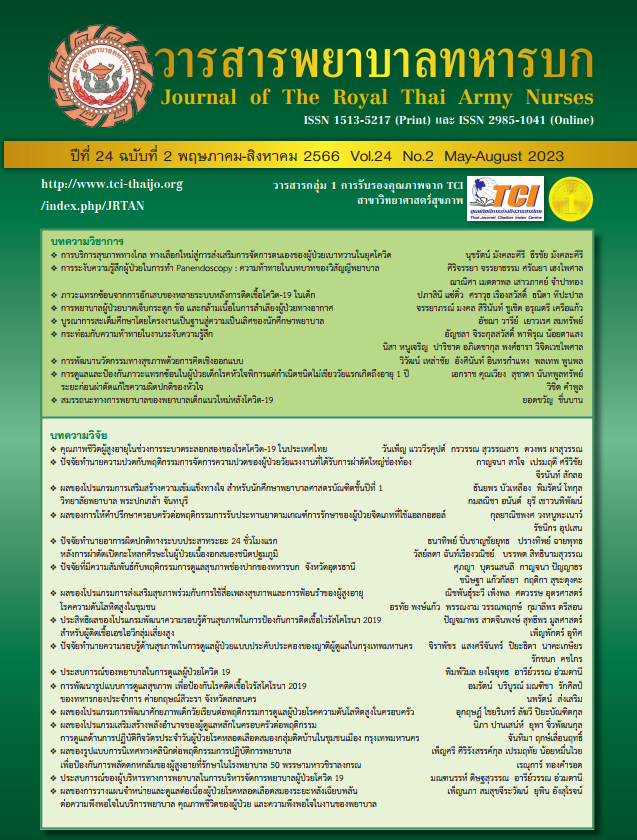Telehealth: Alternative Self-Management Promotion in People with Diabetes During Covid Pandemic
Keywords:
telehealth, Covid 19, diabetes, self-managementAbstract
The epidemic of coronavirus disease 2019 (Covid-19) over the past 2 years has affected the way of life, economy, and society widely. Including health care service system that has changed form of health care service. Information communication technology has been applied in diabetes care during pandemic. This article aimed to provide the evidence of telehealth which focus on modalities and usage of telehealth for delivery healthcare service during covid 19 crisis, the outcomes and the challenging of applying telehealth for self-management in diabetes people. The usage of telehealth enables the provision of synchronous (real-time) and asynchronous (store and forward) consultation and monitoring between patients and clinicians. The advantages of telehealth application to diabetes management enhanced health behaviors for glycemic control during the pandemic and remote health care. The barriers of telehealth were human resource, budget, equipment, and time, including the diabetes patient. However, there are still challenges for applying telehealth in diabetes management after pandemic.
Downloads
References
Emergency Operations Center, Department of disease control, Ministry of Public Health. Coronavirus disease situation report. Bangkok: Emergency Operations Center, Department of disease control; 2022. (in Thai)
International Diabetes Federation. IDF Diabetes Atlas nineth edition. 2019: 4-5.
Aekplakorn W, editor. Report of the sixth national health examination survey in 2019- 2020. 2021: 177-87. (in Thai)
Paneni F, Beckman JA, Creager MA, & Cosentino F. Diabetes and vascular disease: pathophysiology, clinical consequences, and medical therapy: part I. European Heart Journal 2013; 34: 2436-46.
Parohan M, Yaghoubi S, Seraji A, Javanbakht MH, Sarraf P, Djalali M. Risk factors for mortality in patients with Coronavirus disease 2019 (COVID-19) infection: a systematic review and meta-analysis of observational studies. Aging Male. 2021; 23(5): 1416-24.
Roncon L, Zuinb M, Rigatellic G, Zuliani G. Diabetic patients with COVID-19 infection are at higher risk of ICU admission and poor short-term outcome, Journal of Clinical Virology. 2020; 127.
Chee YJ, Tan SK, Yeoh E. Dissecting the interaction between COVID?19 and diabetes mellitus. Journal of diabetes investigation. 2020; 11(5): 1104-14.
Narasimhulu CA, & Singla DK. Mechanisms of covid-19 pathogenesis in diabetes. American Journal of Physiology Heart and Circulatory Physiology. 2022; 323, H403-20.
Barlow J, Wright C, Sheasby J, Turner A, Hainsworth J. Self-management approaches for people with chronic conditions: a review. Patient Education and Counseling. 2002; 48: 177-87.
American Association of Diabetes Educators. An effective model of diabetes care and education, revising the AADE7 self-care behaviors. The Diabetes EDUCATOR. 2020; 46(2): 139-60.
Jangpakdee S, Prasertsong C, Kasiphol T. The effects of health literacy program on covid 19 prevention behaviors type 2 diabetes mellitus patients. Journal of the Royal Thai Army Nurses. 2022; 23(3): 333-41. (In Thai)
Muangsri K, Latkhommom N, Thetnon P, Prasomruk P. Self-care behaviors before-after corona virus disease 2019 (covid 19) pandemic of diabetic mellitus patients in Na More Ma Subdistrict, Mueang Amnat Charoen District, Amnat Charoen province. Thai Health Science Journal and community public health. 2021; 4(1): 1-10. (In Thai)
Marcoux RM, Vogenberg FR. Telehealth: applications from a legal and regulatory perspective. Health Care & Law. 2016; 41: 567-70.
The American College of Obstetricians and Gynecologists. Implementing telehealth in practice; ACOG committee opinion No. 798. obstetrics and Gynecology. 2020; 135: e73-9.
Muralidharan S, Ranjani H, Anjana RM, Allender S, Mohan V. Mobile health technology in the prevention and management of type 2 diabetes. Indian Journal of Endocrinology and Metabolis. 2017; 21(2): 334-40.
Aberer F, Hochfellner DA, Mader JK. Application of Telemedicine in Diabetes Care: The Time is Now. Diabetes Therapy. 2021; 12: 629-39.
Michaud TL, Ern J, Scoggins D, Su D. Assessing the impact of telemonitoring-facilitated lifestyle modifications on diabetes outcomes: A systematic review and meta-analysis. Telemed Journal Health. 2021; 27(2): 124-36.
Hall R, Harvey MR, Patel V. Diabetes care in the time of COVID-19: video consultation as a means of diabetes management. Practical Diabetes. 2022;39(2):33.
Breton M, Sullivan EE, Deville-Stoetzel N, McKinstry D, DePuccio M, Sriharan A, et al. Telehealth challenges during COVID-19 as reported by primary healthcare physicians in Quebec and Massachusetts. BMC Family Practice. 2021; 22(1):192.
Dermkhuntod N, Sura-Amornkul S, Kwancharoen R, Chuantantikamol C. Effect of diabetes self-management education and support (DSMES) in patient with poorly controlled type 2 diabetes. VNURSE. 2022; 24: 1-24. (in Thai)
Riangkam C, Sriyuktasut A, Pongthavornkamol K, Kusakunniran W, Sriwijitkamol A. Effects of a mobile health diabetes self-management program on HbA1C, self-management and patient satisfaction in adults with uncontrolled type 2 diabetes: a randomized controlled trial. Journal of Health Research 2021.
Yingyaun K, Methakanjanasak N. Self -Management Telehealth Innovation for Patients with Diabetes Mellitus Type 2 with Dyslipidemia. Srinagarind Medical Journal. 2017; 31(6): 365-71. (in Thai)
Wiriyapong P, Pongsura S, Fuanchan A, Dhippayom T. The use of telemedicine to support type 2 diabetes care. Journal Medical Health Science. 2021; 28: 165-77. (in Thai)
Thawitsri N. The effect of an online lesson on the calculation competence of medication and intravenous fluids in nursing students. Journal of The Royal Thai Army Nurses. 2022; 23(2): 503-12. (in Thai)
Downloads
Published
How to Cite
Issue
Section
License
Copyright (c) 2023 Journal of The Royal Thai Army Nurses

This work is licensed under a Creative Commons Attribution-NonCommercial-NoDerivatives 4.0 International License.
บทความหรือข้อคิดเห็นใดใดที่ปรากฏในวารสารพยาบาลทหารบกเป็นวรรณกรรมของผู้เขียน ซึ่งบรรณาธิการหรือสมาคมพยาบาลทหารบก ไม่จำเป็นต้องเห็นด้วย
บทความที่ได้รับการตีพิมพ์เป็นลิขสิทธิ์ของวารสารพยาบาลทหารบก
The ideas and opinions expressed in the Journal of The Royal Thai Army Nurses are those of the authors and not necessarily those
of the editor or Royal Thai Army Nurses Association.






